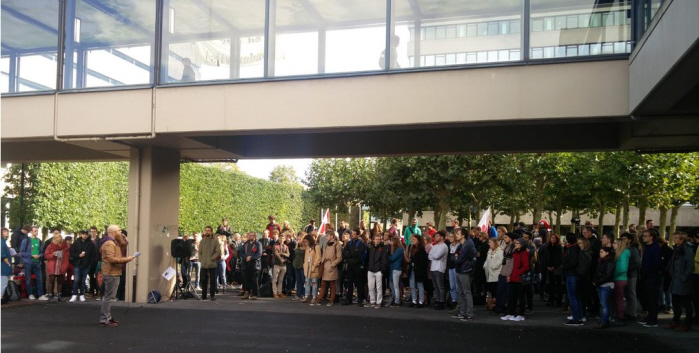Waarom Mathijs van de Sande deze week wél actie voert op de universiteit

Deze week voeren studenten en docenten/onderzoekers aan de Nederlandse universiteiten actie tegen de aangekondigde bezuinigingen in het hoger onderwijs. De belangrijkste eis is niet alleen dat deze bezuinigingen van de baan moeten, maar ook dat er juist meer moet worden geïnvesteerd in de universiteiten.
Willem Schinkel is het met die laatste eis niet eens. In zijn artikel “Waarom ik niet actie voer voor de universiteit” in De Groene Amsterdammer plaatst hij kanttekeningen bij de wijze waarop universiteiten zélf de afgelopen decennia, vaak vrijwillig en uit eigen beweging, de werk- en publicatiedruk hebben opgevoerd. In plaats van meer geld te eisen om onze universiteiten in hun huidige staat in stand te kunnen houden, zouden we eerst eens kritisch moeten kijken naar hoe we zelf de universiteit hebben gemaakt tot wat ze nu is: een semi-commercieel bedrijf waarin productiecijfers belangrijker zijn dan inhoud. “Er is niets in jullie ‘acties’ en eisen te vinden dat naast de wens van een ander universitair budget wijst op de wens van een andere universiteit”, zo betoogt hij.
Schinkel heeft een punt. We moeten kritischer zijn – op de rol die academici en universiteiten zelf spelen, op de publicatiedruk en de eindeloze competitie, op de talloze manieren waarop ook de universiteit allerlei scheve en problematische verhoudingen in onze samenleving creëert of in stand houdt. Het is typisch iets voor academici om te wijzen naar Den Haag, en de hand niet in eigen boezem te steken. Voor Schinkel is het een reden om zich niet bij de acties van WO in actie aan te sluiten.
Daarmee begaat Schinkel op zijn beurt een denkfout die typisch is voor radicale academici. Inhoudelijke consistentie is voor hem kennelijk belangrijker dan meedoen. Pas als zijn collega’s écht radicale eisen gaan stellen, wil hij zich aansluiten: tot die tijd blijft hij liever kritisch aan de zijlijn staan. De ironie is dat hij op die manier geen enkel risico loopt: zijn stellingname gaat inhoudelijk weliswaar veel verder dan die van zijn collega’s en studenten, maar blijft tegelijkertijd ook tandeloos en gratuit. Wie nooit concessies wil doen en op voorhand eisen gaat stellen bij de ‘radicaliteit’ van nieuwe protestbewegingen, zal op politiek vlak weinig veranderen.
Ik stel een alternatieve benadering voor: sluit je aan bij de protesten, engageer je met demonstrerende studenten en collega’s. En zie je kritische noot over de rol van universiteiten/academici juist als een bijdrage aan deze beweging. Daarom deed ik vanmiddag wél mee aan een protestactie van WO in actie op mijn universiteit.
Sterker: ik had het voorrecht om een paar woorden te mogen zeggen op de manifestatie bij de Radboud Universiteit. Hieronder mijn toespraak van vanmiddag:

“Dear students, dear colleagues, dear fellow protesters,
One of the most important things that I hope to teach my students is that words matter. The words that we use to describe and understand our political reality are constitutive of this reality. And this means that if we want to change this reality, if we want to change the status quo, we need to articulate our own political language that allows us to describe and understand this political reality from our own point of view.
As far as I am concerned, there is one important concept that sums up what many of us here have in common – one word that must form an elementary part of our political discourse as a protest movement. And that is: ‘precarity’.
Precarity is a state of social insecurity. There are many examples of everyday precarity that I am sure many of you are familiar with. For example, you are living in precarious conditions when you work on the basis of a temporary contract without regular working hours. It may mean that you are not always sure whether you will be making enough money to pay the bills this month. It may also mean that you work in different places or with different co-workers every time. For those of you who cannot find or afford decent housing, precarity means that you are forced to sign a temporary tenancy agreement – meaning that your landlord can decide to evict you at any moment, and sometimes on just a few weeks’ notice. Precarity means that you may not have access to education, to health care, to social welfare, and other public services. Precarity means that you are living in debt, and that you have no idea how long it will take you to repay it, or at what cost. It means that you may not know where you are going to live, work, or study next year – or even next month.
For academics – and for your young academics in particular – precarity is a huge problem as well. Many of us work on the basis of a temporary contract. They do not know whether their faculty will be able to hire them again next year. They often teach different courses every year, and are not paid for course development and preparation. Whether they will be able to obtain a permanent position in the long term depends on a plurality of things, which are usually beyond their own control: such as the amount of students that will enrol next year, the amount of money that will be left in a faculty’s narrow budget, and the amount of senior staff members with a burnout that need to be replaced. For many academics, precarity means that they are spending most of their evenings, weekends, and vacations working. It means that they cannot get a mortgage or start a family, because they have no permanent source of income. It means that they cannot afford to get ill. It means that they spend much of their time applying for jobs – usually with hundreds if not thousands of competitors, and that they need to be prepared to move to any place in the world for a temporary teaching or post-doc position. For academics, precarity means that they waste a lot of their energy and working hours doing things that are of no use to anyone – and that they are always short on time to do the kind of things that render academic work so interesting and valuable.
Living in a condition of precarity means that you have no solid ground beneath your feet – and no idea of what the future may bring. One may argue, of course, that a certain degree of precariousness or insecurity is a fact of life. No one knows what the future will bring. And sometimes, especially for young people, that can be an exciting idea as well. But the problem is that too much insecurity makes us unhappy. We need to have at least some control over our lives. And this means that at least some things need to be secured – at all times and for everyone: it means that we all need a stable income, decent housing, affordable healthcare, and accessible education.
Now, for several decades in a row, all of these things have been under attack. Our current state of insecurity is not an accident. It is a condition that has been created by years of budget cuts and disinvestment in education, social welfare, health care, and public services. Austerity has forced us into debt and temporary contracts, and thus deprived us of our basic sense of security and control over our lives. The current budget cuts on higher education are only a small part of a political campaign that has been waged for years against everything of value. They are part of a consistent attempt to turn every student into a customer, every academic into an entrepreneur, and every university into a commercial business. To this end, the precarisation of our daily and working lives is an elementary strategy: it forces us to see ourselves and our fellow students and colleagues as competitors. It forces us to live in debt, to accept undesirable working and living conditions, to sleep less and to work in weekends and during evening hours.
So what is to be done? How are we to gain control over our own lives and our own future?
I have a number of suggestions:
– First, it is important to realise that precarity, or the loss of social security, is a problem that affects many people in our society – including those who are in the most vulnerable positions at the so-called ‘labour market’. Precarity is a problem of academics and students as well as cleaners, security workers, public servants, health care workers, and many, many more.
– Second, and as a consequence, this means that students and academic must try to build coalitions with other groups in our society that are equally affected by austerity, and who also find themselves in a precarious position. We must realise that the academic community will not be able to turn the tide all by itself. If we are to win this struggle, we need more allies!
– Third, we have to make demands. Not only to the government in The Hague, but also to our own university and its executive board. Of course, the university must join us in demanding more investment in higher education – and they must do this explicitly and unequivocally. But we must realise that our university itself also bears at least some responsibility for the precarious position that many of us are in. This university should do more to provide job security for its employees – and for young academics in particular. No more temporary contracts, no more unpaid work! This university should do more to provide decent and affordable housing for all of its students. And instead of encouraging endless competition among its students and staff members, the university should do more to resist the commercial business model that is enforced on our universities.
– Finally, if we want to gain more control over our own lives, this also means that we need to gain more political control over our working and learning environment. This movement should not only demand an end to the commercialisation of the university, but should also argue also for its democratisation. Students and staff should have more influence on university policies and should play a bigger role in its decision-making. The academic community should at least be able to elect those in the most important positions at a university (as is the case, for example, in Belgium). Yes – we need more money for our universities to keep higher education accessible. But if we really want to change something in the long term, we must also seek to change our university itself and gain more control over our own lives.”
Mathijs van de Sande
